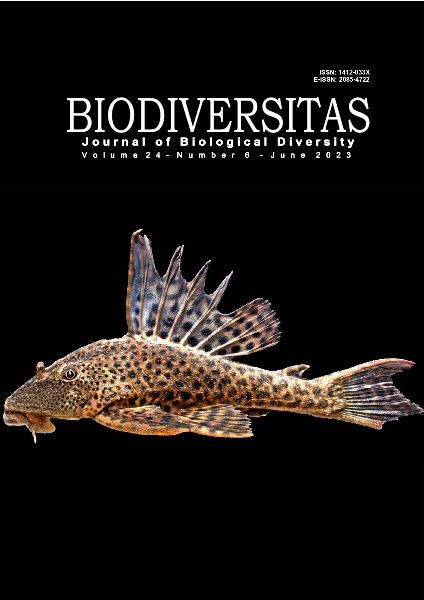Diversity characterization of three varieties of Cymbopogon nardus under different shade conditions
##plugins.themes.bootstrap3.article.main##
Abstract
Abstract. Danata NH, Aini N, Udayana C, Setiawan A, Yamika WSD, Prambudi R. 2023. Diversity characterization of three varieties of Cymbopogon nardus under different shade conditions. Biodiversitas 24: 3574-3582. Cymbopogon nardus L. is a perennial aromatic plant distinguished for producing one of the world's most vital essential oils, citronella. This plant requires abounding sunlight to maximize the growth and quality of essential oils. The development of citronella can be implemented with an agroforestry system as an intercrop. However, the deterring factor restricting the propagation of citronella as an intercrop in agroforestry systems is the unavailability of adequate sunlight, consequently deteriorating the growth and quality of essential oils. This study investigated three varieties of C. nardus, i.e., Seraiwangi 1, Sitrona 1 Agribun, and Sitrona 2 Agribun, at distinctive shade proportions, i.e., 0%, 25%, 50%, and 75% shade. The examined parameters included the growth, physiological responses, yield, and quality of essential oils, i.e., citronellal, citronellol, and geraniol. Results demonstrate that the various types and shade percentages affect most examined parameters. The Seraiwangi 1 variety grown under 0% and 25% shade had nearly the same value, while the Sitrona 1 Agribun and Sitrona 2 Agribun varieties continued to experience declines ranging from 0%, 25%, 50%, to 75%. Nevertheless, shade extensively influences physiological responses such as photosynthetic rate and stomata width, and contrastingly there was a cipher effect on the stomata length. In the yield parameters, the oil concentration declined with the increase in shading percentage. The Seraiwangi 1 delivered superior quality of citronellal, citronellol, and geraniol compared to Sitrona 1 Agribun and Sitrona 2 Agribun varieties.


 https://orcid.org/0000-0002-5600-0443
https://orcid.org/0000-0002-5600-0443